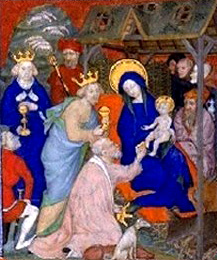
Epiphany (from Koine Greek ἐπιφάνεια “appearance”, “manifestation”) is a Christian feast day which celebrates the revelation of God made Man in the person of Jesus Christ. It falls on January 6 or on a Sunday close to that date. January 6 in the Julian Calendar, which is followed by some Eastern Churches, corresponds at present to January 19 in the Gregorian Calendar, which is the official civil calendar in most countries. On this day, Western Christians commemorate principally the visitation of the Biblical Magi to the child Jesus, i.e., his manifestation to the Gentiles; Eastern Christians commemorate the baptism of Jesus in the Jordan River, seen as his manifestation to the world as the Son of God. It is also called Theophany, especially by Eastern Christians.
Epiphany, meaning ‘appearance’ or ‘manifestation’, is a Christian feast intended to celebrate the “shining forth” or revelation of God to mankind in human form, in the person of Jesus. Some Christians commemorate the visitation of the Magi to the child Jesus on this day, while others use the day to commemorate the baptism of Jesus as an adult. It is also called Theophany, especially by those commemorating Christ’s baptism.
Date of commemoration
Prior to the reforms of 1970, the Roman Catholic Church (and prior to 1976, the Anglican churches) celebrated Epiphany as an eight-day feast beginning on January 6 and continuing through the Octave of Epiphany, or January 13. Many continue to use this calendar, celebrating the feast of the Holy Family on the Sunday within the octave.
More recently, many Americans mark Epiphany on the Sunday after the first Saturday in January (before this the Sunday between January 1 and January 6 in years when there was one, was designated the Feast of the Holy Name of Jesus), and most Roman Catholics in the United States (along with many Protestants) now formally end the Christmas season with the Baptism of the Lord, after which the first period of Ordinary Time begins. (But note that some Churches, such as the Anglican Catholic Church, and Traditional Roman Catholics in the United States and other countries (e.g., France, Germany, Italy, Spain, Brazil, Vatican City), still maintain the pre-1970 calendar; for these bodies, Christmas still has twelve days and ends on January 5, and Epiphany is still celebrated on January 6 with an 8-day octave.) Since 2007 the Roman Catholic Church in England & Wales celebrates the Epiphany on the Sunday closest to 6 January; though in celebrations of the ‘extraordinary form’ of the Roman Rite (the so-called Tridentine Mass), the feast continues to be observed on January 6.
In the Church of England, the Epiphany is classified as a Principal Feast and is observed on 6 January or on the Sunday between 2 and 8 January. There is also an Epiphany season, observed between the season of Christmas and the first period of Ordinary Time. It begins at Evening Prayer on the Eve of the Epiphany and ends at Evening Prayer (or Night Prayer) on the Feast of the Presentation (which may be celebrated on 2 February or on the Sunday between 28 January and 3 February).




